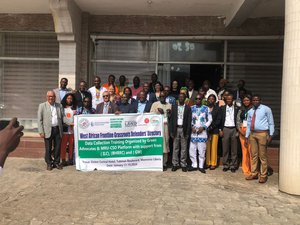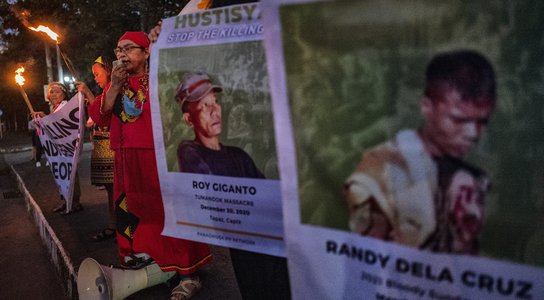Imagine you face a danger so significant that it could cost you your life. Now imagine that those in positions of power in government and multinational corporations don’t see the danger – or, worse still, refuse to acknowledge that it even exists. What would you do? Your best bet would be to gather and present evidence to prove that the danger is real – and to demand that urgent action is taken to mitigate and prevent the root of the threats. After all, your life depends on it.
This is exactly what is happening in West Africa to people and communities who are courageously defending their lands and environment from being destroyed. Defenders might be peacefully opposing mining activities that pollute their waters, challenging forced evictions their communities face, or perhaps calling for oil companies to halt their relentless breaches of the most basic human rights. In doing so, they are exposing themselves to all kinds of attacks ranging from threats to criminalisation, from harassment to murder. Yet, these reprisals remain, for the large part, invisible.
We at Global Witness know this because, since 2012, we have been documenting the most severe form of attacks: murder. Up until the end of 2022, we have recorded at least 1,910 killings of land and environmental defenders around the world. Africa accounts for less than 6% of such killings – we have recorded 112 cases for the whole continent in just over a decade. The figures from West Africa are significantly lower with less than 0.5% documented. We know that accessing information has been our greatest challenge, and, as a result, we know our data doesn’t reflect what is really happening on the ground.
We are determined to change this, and that is why, earlier in January, we joined Liberian organisation Green Advocates International and the Mano River Union Civil Society Platform (MRU CSO) at a workshop in Monrovia, where they presented the West African Frontline Grassroot Defenders’ Directory - which Global Witness is proudly supporting. The goal of the Directory is simple, yet powerful: for the first time, it will allow defenders in West Africa to systematically document the attacks they face.

Participants at the workshop "West African Frontline Grassroot Defenders' Directory"
“The intention is to start a Directory which shows the situation in West Africa – it will document and show what goes on for defenders. We want to be in a position to tell our own stories.” - Peter Quaqua, Green Advocates International
It will complement data on reprisals already collected globally by environmental organisation – including Global Witness – and will help to build our knowledge of trends in attacks, as well as profiling the cases of some of West Africa’s most determined activists. A mobile phone is all that will be required to record this information and upload it to a central database, which will then be analysed to understand the current reality defenders face, as well as trends and emerging challenges.
However, this is not just about technology and statistics. The stories and testimony of the workshop participants remind us that defenders are the heartbeat of the Directory – they are the people close to the issues and harms, and who will work to identify and document reprisals. This is why the civil society representatives from all 16 West African countries were present at the event. People around the table included local activists, journalists, lawyers, investigators. It is them, and many others, who have their ears to the ground and who have seen, and sometimes have experienced themselves, threats as a result of their environmental work. It is their presence in communities and their engagement with grassroot movements that will unearth information on reprisals across the region. The message from Monrovia is that now is the time to do this, and that the workshop marks a turning point.
“This is a seminal moment that brings together organisations from across the West Africa Region. Here, we are using data for change. This is a victory” said Christiam Mukosa, Representative of the United Nations Office of the High Commissioner for Human Rights, addressing the participants on the first day of the workshop.
Echoing his words, every single participant committed to contributing to the Directory and using its findings to demand concrete action from African government across the region. It is with this information at hand that it will finally be possible to push for change. And change is urgently required in West Africa. Defenders need their governments to establish effective protection measures, and they need drastic change in corporate practices. The Directory will put the evidence on the table to stop decision-makers from looking away.


